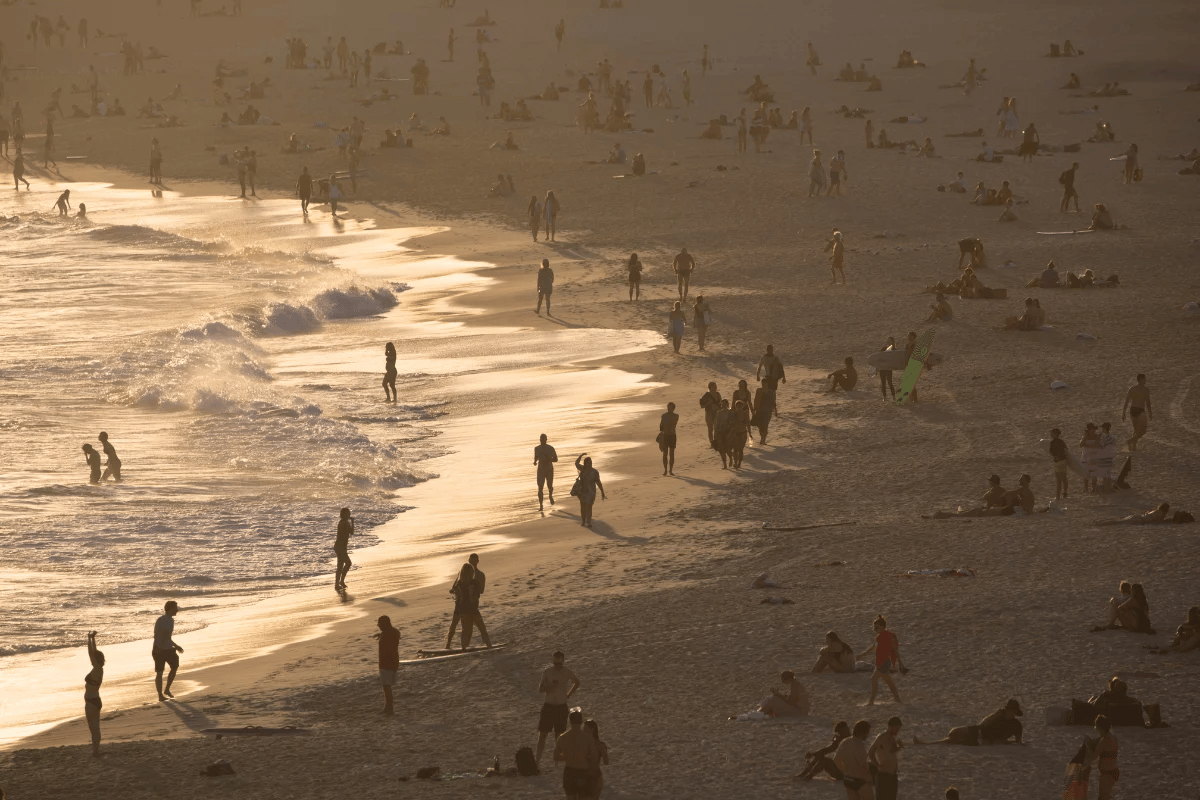
The warning signs are already here.
October heat records have been smashed across New South Wales, Queensland and South Australia.
Meanwhile, outback towns are hitting previously unseen highs, all while being weeks away from the official start of summer.
For millions of Australians, this creates a perfect heatwave: extreme temperatures that will drive air conditioning usage to new highs, contributing to a rise in household energy bills.
The heat forecast that's got meteorologists concerned
The Bureau of Meteorology predicted a 60 to 80 per cent chance that maximum temperatures across Australia will be above average over the next three months, covering the critical period from November to January.
The outlook also predicts unusually warm nights almost everywhere, meaning there will be little relief even after sunset.
Sydney's average maximum temperature for October could reach 27.1°C, roughly 5°C above average and potentially beating both the October record from 1988 and the November record from 2019.
Last year, Australia experienced its second-hottest year on record, and according to long-range weather forecasts, more heat is expected in this year. Australia has warmed by 1.51°C since national records began in 1910, with an increase in extreme heat events.
'Year on year, we're experiencing warmer and warmer temperatures, and the result is more severe weather as well.'
The energy bill crunch hitting household budgets
Research from Finder revealed that 26 per cent of Australians now consider their energy bill one of their most stressful expenses.
The average quarterly bill just reached $406 in October 2025, a 17 per cent jump from $347 back in 2021.
About one in three households received an unexpectedly high energy bill in the past 12 months, adding to the financial anxiety many are feeling as we head into a scorching summer.
The situation has been complicated by the end of various government rebate programs.
Energy costs lifted almost 25 per cent by August 2025, according to the Australian Bureau of Statistics.
Not to mention, power Subsidies for Queensland ($ 1,000), Western Australia ($400), and Tasmania ($250) households have have expired.
Innovative cooling strategies that won't break the bank
The good news is that staying cool doesn't have to mean financial disaster.
Finder utilities expert Mariam Gabaji offered several strategies that could make a difference to your summer bill.
The degree difference that saves dollars
'Raise your air conditioning thermostat by just a degree or two,' Ms Gabaji advised.
'You'll save roughly 10 per cent on your bill for every degree.' For a household spending $400 per quarter, a single degree could save $40 per quarter.
The simple fixes that cost nothing
Some of the most effective cooling strategies require no upfront investment:
Clean your air conditioner filter regularly for optimal efficiency
Close blinds or blackout curtains during the day to block heat
Use door seals to prevent cool air from escaping
Create cross-ventilation by opening windows on opposite sides of the house during cooler evening hours
Did you know?
Government support is still available
While many state rebates have ended, the federal government continues to provide $300 worth of energy bill relief throughout the 2025 financial year. Labor is also promising an additional $150 per household until the end of this year. Check with your energy provider to ensure you're receiving these credits.
When to consider bigger changes
For homeowners, this summer may be the ideal time to explore energy-efficient cooling upgrades.
Many state governments continue to offer rebates for energy-efficient air conditioning systems, heat pumps, and insulation improvements.
Modern reverse-cycle air conditioners use up to 50 per cent less energy than units installed a decade ago, while proper insulation could reduce cooling costs by up to 40 per cent.
Health considerations for hot weather
Extreme heat has caused more deaths in Australia than any other natural hazard, making reliable cooling plans crucial for households.
During extreme heat days, consider:
Visiting air-conditioned public spaces like shopping centres, libraries, or community centres during peak heat hours
Staying hydrated with water rather than alcohol or caffeine
Wearing loose, light-coloured clothing made from natural fibres
Taking cool showers or baths to lower body temperature
Your summer survival checklist
- Service your air conditioner before the heat hits
- Set up payment plans with your energy provider if bills are a concern
- Identify local cooling centres in your area
- Stock up on electrolyte drinks and ensure medication storage is heat-appropriate
- Have a plan for power outages, including battery-powered fans and phone chargers
Looking ahead
As we head into what meteorologists are warning could be an exceptional summer for heat, the message is clear: prepare now, rather than react later.
Whether that means using your air conditioner more often, taking advantage of government rebates, or simply finding ways to stay cool without breaking the bank, the time for preparation is now.
Have you started preparing your home and budget for what could be Australia's hottest summer yet? What cooling strategies have worked best for your household in previous years? Share your experiences and tips in the comments below—your advice could help fellow Aussies stay cool this summer.
Primary source
Summer forecast 2025: How hot will it get in Australia?
Cited text: 'Three states — New South Wales, South Australia and Queensland — clocked previously unrecorded outback heat levels for October...'
Excerpt: 'October heat records have been smashed across New South Wales, Queensland and South Australia.'

What will this summer actually be like? A quick weather check.
Heat records are tumbling. www.mamamia.com.au
www.mamamia.com.au
Sydney's Heat Wave Could Mean Bad News For Summer Weather | marie claire
Cited text: 'Covering November to January, the outlook predicts a 60 to 80 per cent chance of above-average maximum temperatures nationwide, and unusually warm nights...'
Excerpt: 'The Bureau of Meteorology predicted a 60 to 80 per cent chance that maximum temperatures across Australia will be above average over the next three months, covering the critical period from November to January.'

Australia’s Wild Weather Is Signalling A Scorching Summer
Sydney weather is already breaking records, with fire bans and soaring heat setting the stage for a long, hot summer. www.marieclaire.com.au
www.marieclaire.com.au
Australia's weather outlook for 2025 after record heat in 2024 | Inner East Review | Melbourne, Victoria
Cited text: 'Australia sweated through its second-hottest year ever in 2024, and according to the long-range weather forecast, more heat is coming in 2025.'
Excerpt: 'Last year, Australia experienced its second-hottest year on record, and according to long-range weather forecasts, more heat is expected in this year.'

'Significant heat': more heatwaves will follow second-warmest year on record
Find out how you can keep cool when the temperature soars.www.innereastreview.com.au
State of the Climate 2024: Bureau of Meteorology
Cited text: 'Extreme heat has caused more deaths in Australia than any other natural hazard and has major impacts on ecosystems and infrastructure.'
Excerpt: 'Extreme heat has caused more deaths in Australia than any other natural hazard, making reliable cooling plans crucial for households.'







